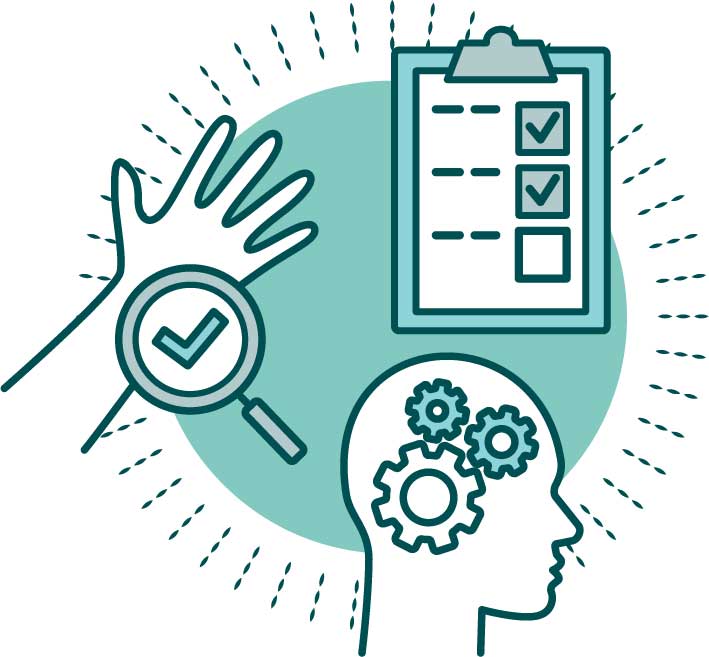
Do you hear this a lot when you’re agonising over a decision: ‘You’re overthinking it’?
Firstly, know that overthinking is something we all do from time to time when the pressure mounts. You may find yourself replaying events and conversations in your head or try to ‘solve’ an issue which is beyond your control. If you are overthinking everything, you might:
You may not always be conscious of overthinking, but if you are a chronic overthinker, it will be using up your time, mental energy, and emotional resources. Think of all that time you could better spend doing something more rewarding (but don’t overthink it!)!

So, what is overthinking a symptom of? Overthinking everything can be a symptom of anxiety and is a sign of your brain focusing on a particular thought to the exclusion of all else. Therefore, if left unchecked, the distress caused by overthinking can lead to other psychological problems such as OCD, depression, and insomnia. Overthinking can also be a symptom of these conditions too.
Overthinking has two main components:
Ruminating: repetitive thoughts about a past situation, which often involve feelings of guilt, regret and self-loathing
Worrying: cycle of negative thoughts trying to predict the future
Overthinking isn’t a solution
Although it may seem obvious, overthinking doesn’t help. It may seem to your brain that it is solving a problem, but if the same thought keeps recurring, then you need to step in to take control.
So how do you deal with overthinking? Follow these simple stress relief tips to stop worrying and put an end to repetitive thoughts.
Finally…
If you’re a chronic overthinker, you can’t expect to stop worrying overnight, but by making small lifestyle changes you can gradually dial down the intensity of your overthinking. Overall, the most important takeaway in how to deal with overthinking is to be more mindful and more present in your thoughts.
Share this post
| Cookie | Duration | Description |
|---|---|---|
| __stripe_mid | 1 year | Stripe sets this cookie cookie to process payments. |
| __stripe_sid | 30 minutes | Stripe sets this cookie cookie to process payments. |
| _abck | 1 year | This cookie is used to detect and defend when a client attempt to replay a cookie.This cookie manages the interaction with online bots and takes the appropriate actions. |
| ak_bmsc | 2 hours | This cookie is used by Akamai to optimize site security by distinguishing between humans and bots |
| bm_sz | 4 hours | This cookie is set by the provider Akamai Bot Manager. This cookie is used to manage the interaction with the online bots. It also helps in fraud preventions |
| cookielawinfo-checkbox-advertisement | 1 year | Set by the GDPR Cookie Consent plugin, this cookie is used to record the user consent for the cookies in the "Advertisement" category . |
| cookielawinfo-checkbox-analytics | 11 months | This cookie is set by GDPR Cookie Consent plugin. The cookie is used to store the user consent for the cookies in the category "Analytics". |
| cookielawinfo-checkbox-functional | 11 months | The cookie is set by GDPR cookie consent to record the user consent for the cookies in the category "Functional". |
| cookielawinfo-checkbox-necessary | 11 months | This cookie is set by GDPR Cookie Consent plugin. The cookies is used to store the user consent for the cookies in the category "Necessary". |
| cookielawinfo-checkbox-others | 11 months | This cookie is set by GDPR Cookie Consent plugin. The cookie is used to store the user consent for the cookies in the category "Other. |
| cookielawinfo-checkbox-performance | 11 months | This cookie is set by GDPR Cookie Consent plugin. The cookie is used to store the user consent for the cookies in the category "Performance". |
| elementor | never | This cookie is used by the website's WordPress theme. It allows the website owner to implement or change the website's content in real-time. |
| PHPSESSID | session | This cookie is native to PHP applications. The cookie is used to store and identify a users' unique session ID for the purpose of managing user session on the website. The cookie is a session cookies and is deleted when all the browser windows are closed. |
| viewed_cookie_policy | 11 months | The cookie is set by the GDPR Cookie Consent plugin and is used to store whether or not user has consented to the use of cookies. It does not store any personal data. |
| Cookie | Duration | Description |
|---|---|---|
| _mcid | 1 year | This is a Mailchimp functionality cookie used to evaluate the UI/UX interaction with its platform |
| mailchimp_landing_site | 1 month | The cookie is set by MailChimp to record which page the user first visited. |
| Cookie | Duration | Description |
|---|---|---|
| _ga | 2 years | The _ga cookie, installed by Google Analytics, calculates visitor, session and campaign data and also keeps track of site usage for the site's analytics report. The cookie stores information anonymously and assigns a randomly generated number to recognize unique visitors. |
| _gat_gtag_UA_57442626_1 | 1 minute | Set by Google to distinguish users. |
| _gcl_au | 3 months | Provided by Google Tag Manager to experiment advertisement efficiency of websites using their services. |
| _gid | 1 day | Installed by Google Analytics, _gid cookie stores information on how visitors use a website, while also creating an analytics report of the website's performance. Some of the data that are collected include the number of visitors, their source, and the pages they visit anonymously. |
| Cookie | Duration | Description |
|---|---|---|
| _fbp | 3 months | This cookie is set by Facebook to display advertisements when either on Facebook or on a digital platform powered by Facebook advertising, after visiting the website. |
| fr | 3 months | Facebook sets this cookie to show relevant advertisements to users by tracking user behaviour across the web, on sites that have Facebook pixel or Facebook social plugin. |
| test_cookie | 15 minutes | The test_cookie is set by doubleclick.net and is used to determine if the user's browser supports cookies. |
| Cookie | Duration | Description |
|---|---|---|
| _tcfpup | 5 years | No description available. |
| _tcSecSess | session | No description available. |
| _tcSessInfo | session | No description available. |
| CookieLawInfoConsent | 1 year | No description |
| cookies.js | session | No description available. |
| m | 2 years | No description available. |
| ti_ukp | 5 years | No description available. |